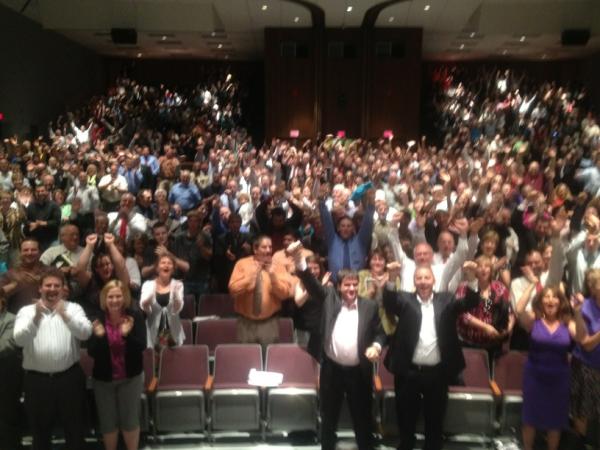The Challenge Groups kicked off around the country this week, and the feedback has been amazing. Communities are essential to the health of individuals, families, and society. The LIFE business builds communities and bonds them together through the Mental Fitness Challenge. If you attended a Challenge Group last night, please share your thoughts and highlights.
Here is one of several articles I have written on community.
Sincerely,
The Desire for Community
The more I read, the more I realize the true secret to success in business and life is related to the strength of relationships within a person’s community. The myth of rugged isolated individualism, although enduring, is, in truth, only a myth. Economic, educational, even political effectiveness are all improved when people work together. Please don’t misunderstand me; I haven’t turned to economic communism; however, I do comprehend better than I previously did how so many people have been drawn into this evil illogical doctrine. Specifically, most people, if given the choice between being alone or in community, will choose community, even if the association is Biblically wrong, thus communism’s growth. In fact, a cursory look at organizations as diverse as communism, the mafia, and gangs will exhibit the enduring need for community.
If community is essential to human beings, then the question is: How do we incorporate community into a society without sacrificing life, liberty, and property? Since liberty cannot exist where the State dictates, the idea of community and freedom precludes State control. Therefore, free communities are misnomers unless they are voluntary organizations. However, although the non-involvement of the State is essential, it isn’t sufficient to create community. The other side of the equation is for people to learn how to work within a community setting. Consequently, the atomistic rugged individualism of American myth must be replaced by men and women who work within a Biblical framework of ordered liberty and love. In other words, the greedy, self-centered capitalist is not a true picture of a free-enterprise Biblical community. In fact, this caricature of American freedoms pinpoints what is plaguing America – the loss of community roots and liberty (Social Power), instead, replaced by today’s (State Power) crony capitalism.
State Power vs. Social Power
Murray Rothbard, the late dean of Austrian Economists, wrote in Conceived in Liberty:
My own basic perspective on the history of man, and a fortiori on the history of the United States, is to place central importance on the great conflict which is eternally waged between Liberty and Power, a conflict, by the way, which was seen with crystal clarity by the American revolutionaries of the eighteenth century. I see the liberty of the individual not only as a great moral good in itself (or, with Lord Acton, as the highest political good), but also as the necessary condition for the flowering of all other goods that mankind cherishes: moral virtue, civilization, the arts and sciences, economic prosperity. Out of liberty, then, stem the glories of civilized life. But liberty has always been threatened by the encroachments of power, power which seeks to suppress, control, cripple, tax, and exploit the fruits of liberty and production. Power, then, the enemy of liberty, is consequently the enemy of all the other goods and fruits of civilization that mankind holds dear. And power is almost always centered in and focused on the central repository of power and violence: the state. With Albert Jay Nock, the twentieth-century American political philosopher, I see history as centrally a race and conflict between “social power” — the productive consequence of voluntary interactions among men — and state power. In those eras of history when liberty — social power — has managed to race ahead of state power and control, the country and even mankind have flourished. In those eras when state power has managed to catch up with or surpass social power, mankind suffers and declines.
In sum, wherever State Power flourishes, Social Power declines. Thankfully, however, the reverse is true as well. By standing on the intellectual shoulders of both Nock and Rothbard, we see that societies can be organized around two competing philosophical choices:
1. State Power: Top down external discipline and the subsequent loss of liberty endured.
2. Social Power: Bottom up internal discipline and the subsequent ordered liberty enjoyed.
Restoring Social Power – Volunteer Communities
The first option (State Power) is the real-life history of America since around the Civil War, with State Power moving ahead and Social Power in subsequent decline. Since 1913, however, the battle has become a full-fledged drubbing, with State Powers triumphing in the Federal Reserve Act, the Federal Income Tax amendment, and the democratic election of Senators. In truth, it’s hard to fathom a worse mix of legislation (as related to Social Power) in one year, in one country, than what occurred in America in that disastrous year of 1913. In other words, 1913 wasn’t just (to use Oliver DeMille’s term) a freedom shift, it was a freedom rout. DeMille’s soon-to-be-released book 1913 will elaborate further on these fateful events.
The second option (Social Power) is America’s (and the West’s) best hope for freedom. America needs a community restoration, starting, not from the top down (State Power), but rather, from the bottom up (Social Power), in order to revitalize America. Social Power is fueled by social capital – a sociological concept which refers to the value of social relations and the role of cooperation and confidence to get collective results in any endeavor – to paraphrase Robert Putnam, in is classic Bowling Alone. Putnam explains the key role of social capital, “A society characterized by generalized reciprocity is more efficient than a distrustful society, for the same reason that money is more efficient than barter. If we don’t have to balance every exchange instantly, we can get a lot more accomplished. Trustworthiness lubricates life. Frequent interaction among a diverse set of people tends to produce a norm of generalized reciprocity.” Furthermore, Putnam argues, “Does social capital have salutary effects on individuals, communities, or even entire nations? Yes, an impressive and growing body of research suggests that civic connections help make us healthy, wealthy, and wise. Living without social capital is not easy, whether one is a villager in southern Italy or a poor person in the American inner city or a well-heeled entrepreneur in a high-tech district.” Social capital matters, in other words, both personally, professionally, and politically.
Converting Dreams into Realities through Communities
Putnam goes on to list five specific areas where the trust and understanding inured by social capital helps translate aspirations into realities:
1. Social capital allows citizens to resolve collective problems more easily through improved teamwork.
2. Social capital greases the wheels that allow communities to advance smoothly through improved trust.
3. Social capital helps widen the awareness of fellow citizens that their fates are intertwined through improved understanding.
4. Social capital serves as conduits for the flow of helpful information and resources to accomplish community and individual goals.
5. Social capital improves individual lives through psychological and biological processes. In fact, numerous studies suggest lives that are rich in social capital cope with trauma and illnesses significantly more effectively.
Despite social capital’s overwhelming advantages, Putnam acknowledges its decline, writing, “Americans have had a growing sense at some visceral level of disintegrating social bonds.” Furthermore, he writes, “More than 80% of Americans said there should be more emphasis on community, even if it puts more demands on individuals.” In sum, social capital isn’t just the fuel for Social Power – a necessary check on State Power – but it also enhances individual lives through the sense of belonging engendered within communities. Strikingly, then, the decline of social capital, not only attacks society’s freedoms, but also attacks an individual’s well-being. Simply put, America cannot remain free without a revival of Social Power through building social capital in voluntary communities. With so much at stake, why aren’t more people focused on restoring voluntary communities throughout America and the West? That question will be answered in further articles on Social Power and communities. Sincerely, Orrin Woodward










